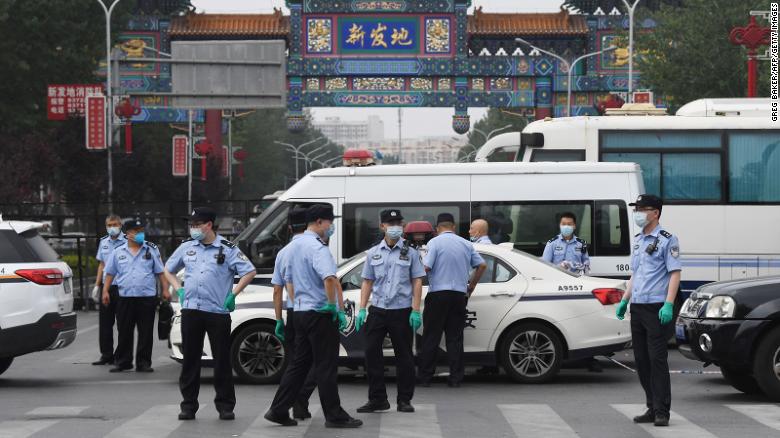Second Time Around?
"The Beijing outbreak very likely didn't start in June, or May, but a month before that."
"There can only be so many cases around us now if there were already many people with no symptoms or light symptoms back then."
"This is our current speculation but we need to verify it."
"There must have been a lot of asymptomatic or mild cases in [the market], that's why the virus has been detected so much in the environment."
Gao Fu, head, Chinese Center for Disease Control, Shanghai
"I'd be reticent to be in the position where all packaging and other things would need to be systematically tested."
"I don't think it's the primary hypothesis [that food shipped from abroad is responsible for the new cases of COVID-19 in China] but it needs to be explored."
Michael Ryan, executive director, World Health Organization Health Emergencies Program
 |
| Xinfadi market, the largest wholesale food market in Beijing, is at the center of the city's latest coronavirus outbreak. |
"[A large amount of environmental samples collected from the Xinfadi market had been tested positive for the coronavirus, which showed that] the virus has entered [the market] for quite a while."Smug gloating and the feeling of victory over a deadly virus threatening a good proportion of the population with early death appear not warranted in the instance of a mutating, deadly, threatening virus that has intruded on the lives of millions worldwide. A crestfallen New Zealand prime minister was forced to backtrack on her recent celebratory assertion that her country was free of the terror of awaiting COVID onset with all the painful uncertainty attributable to the virus when several days later COVID-19 struck again, and again, and again.
"According to preliminary genomic and epidemiological study results, the virus is from Europe, but it is different from the virus currently spreading in Europe. It's older than the virus currently spreading in Europe."
Zhang Yong, Chinese CDC official
"Newly diagnosed cases reported every day does not equal new infections and the outbreak being under control doesn't mean there will be zero new cases tomorrow.""There will be cases reported tomorrow and the day after tomorrow. These reported cases are the detection process of the previous infections. Not new infections. The new infections are only sporadic.""As long as there are risks of imported cases, imported infections and small-scale clusters caused by imported infections might occur anywhere in China. From this point of view, [the Beijing outbreak] is normal."
Wu Zunyou, chief epidemiologist, China's CDC
Just as Beijing which several weeks earlier had gloated it had won the battle over the dread virus is now being channeled into the realization that there is no easy escape and the massive city of 22 million people has had to undergo a reversal of its new, open policy and once again impose strictures on public and social life to dampen the fervour of a returned coronavirus. The new case numbers are not alarmingly high, not yet, but through past experience it is known how volatile those numbers can be in response to explosive viral communication.
So, in response to a seemingly second wave entry of COVID, Beijing authorities cancelled 1,200 flights out of the capital both in and out at its two airports, taking steps as well to reduce long-distance bus services. Once again those living in Bejing have been returned to a state of partial lockdown, with no non-essential travel out of the city being permitted.The rash of new cases discovered at the Xinfadi wholesale market, the largest in the city, supplying it with 80% of its fresh food, animated authorities to instant response.
"We need to take decisive action ... resolutely control this gathering epidemic, and resolutely curb its spread inside and outside the city", declared Chen Bei, deputy party chief of Beijing in response to the "severe" risk of infection, justifying disallowing travel in and out of the city for fear of spreading the infection countrywide. Since June 13, 3.56 million people were tested for the virus which, according to experts, may have gone undetected for weeks.
The sudden reappearance of the dreaded virus remains a mystery to Chinese researchers, amidst concern that it may have been within livestock and produce shipped into the country from abroad. Should anything of that nature be proven, the result would be disastrous for international trade. The rumours of infection caused by imported salmon from Norway was quickly dispatched. thought so because the DNA was found on cutting boards at the Xinfadi market used exclusively for cutting up salmon.
The new influx of cases had national media speculating over source; the Global Times which reflects the opinion of Beijing, questioned whether the pandemic originated from Europe, and not China. The virus, according to Wu Zunyou, the top epidemiologist at the Chinese CDC, stated that the virus was found as well throughout the hall of the Xinfadi market. Other Chinese cities including Shanghai, began to issue quarantine requirements and restrictions for travellers from Beijing.
 |
| People who have had contact with the Xinfadi market line up for coronavirus tests at a testing center on June 17. |
Labels: Beijing, China, COVID resurgence, Europe, Xinfadi Market

<< Home